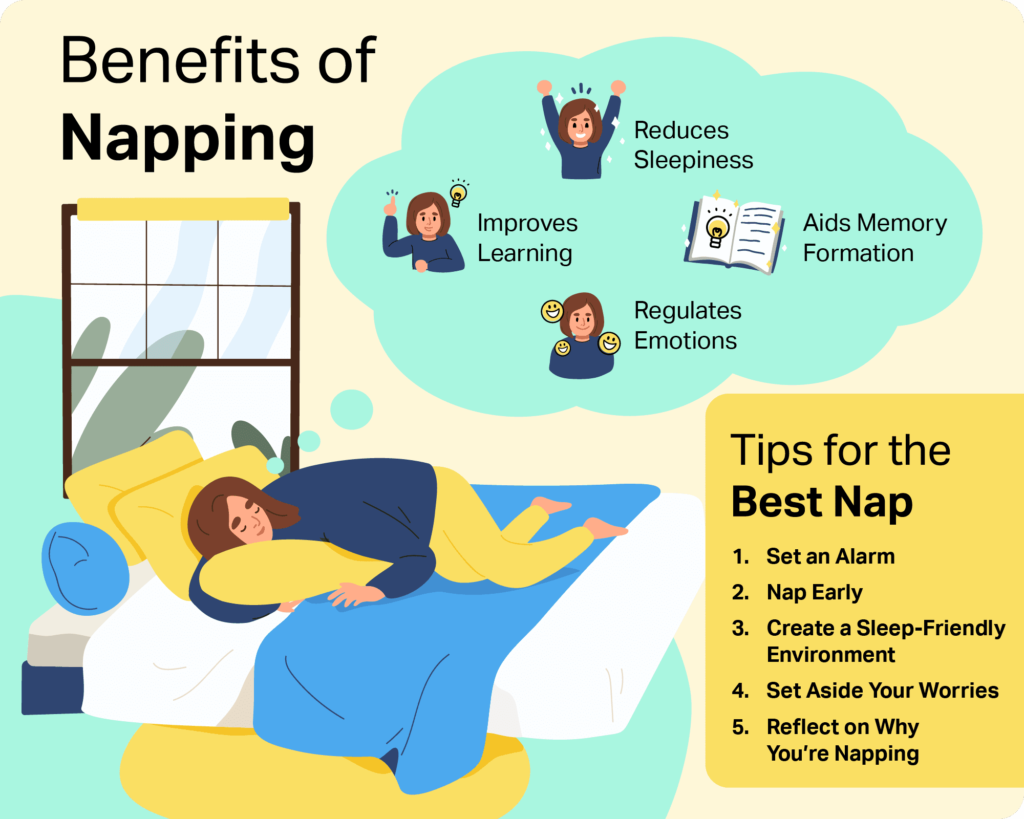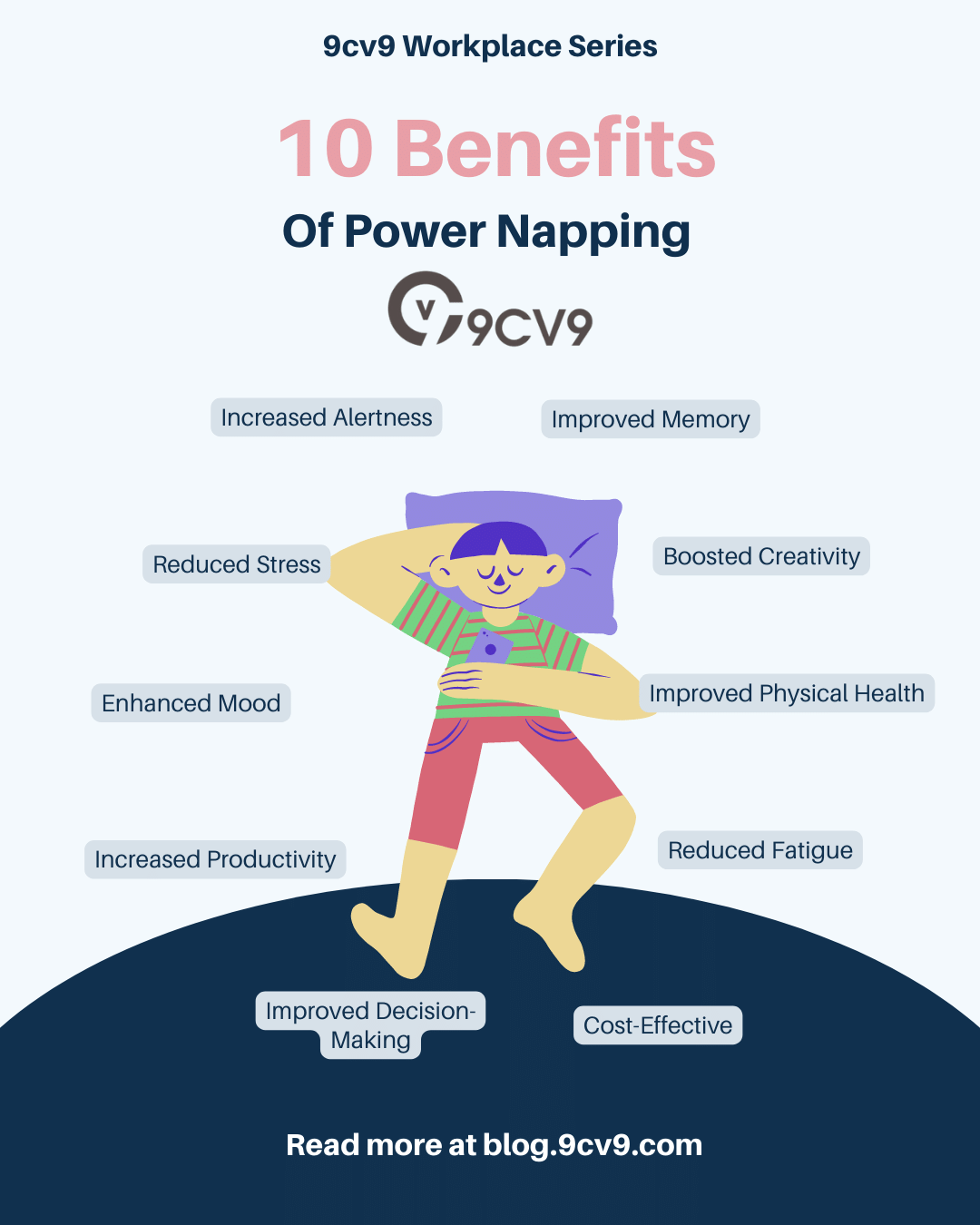Have you ever felt the midday slump where your energy drops and your focus fades? You’re not alone.
Many people experience this daily dip in alertness. What if there were a simple solution that could refresh your mind, boost your mood, and enhance your productivity? Naps may just be the answer you’re looking for. By taking short, strategic breaks to rest, you can unlock a host of benefits that improve your day-to-day life.
Imagine feeling revitalized and ready to conquer the rest of your day with ease. Intrigued? Keep reading to discover how incorporating naps into your routine can transform your well-being and supercharge your performance.
Boosting Productivity
Do you ever feel the afternoon slump creeping in, slowing down your productivity? You’re not alone. Naps aren’t just for children. Taking a short nap can boost your productivity, helping you power through tasks with renewed energy. Let’s dive into how naps can enhance your focus and improve memory retention, making your workday more efficient and enjoyable.
Enhancing Focus
Imagine hitting a wall with your concentration around 2 p.m. It happens to the best of us. A quick nap can be the perfect reset button. Just 20 minutes can recharge your brain, sharpening your focus like a freshly sharpened pencil. When you wake up, the fog lifts, and you can tackle your to-do list with clarity.
Think about how much more you could achieve with improved concentration. Have you ever noticed how your brain seems to wander when you’re tired? A nap can bring your wandering mind back to the task at hand. You might find yourself finishing tasks faster, leaving more room for creativity and problem-solving.
Improving Memory Retention
Do you struggle to remember what you read or learned earlier in the day? A nap can help with that too. Studies show that sleep plays a crucial role in memory consolidation. When you nap, your brain processes information, making it easier to recall later.
Consider the last time you were preparing for a presentation or trying to learn something new. With a nap, you could remember details more vividly. Your brain organizes and stores the information, making it readily available when you need it. Wouldn’t that make your workday smoother?
If naps can enhance focus and improve memory, why not give them a try? A well-timed nap might be the secret weapon you’ve been missing for boosting your productivity. Try it and see how it transforms your day. You deserve to work at your best. Why not make it happen?

Credit: consumer.org.my
Improving Mood
Taking a nap can do wonders for your mood. It acts as a reset button, helping you feel refreshed and more balanced. Whether it’s a short 20-minute power nap or a longer one, naps can significantly enhance your emotional well-being. Let’s explore how naps can improve your mood by reducing stress and increasing positivity.
Reducing Stress
Stress can weigh you down. A nap helps reduce this burden. During sleep, your body releases hormones that calm your mind. This natural relaxation lowers stress levels. As a result, you feel more at ease. A short nap can provide a mental break. It allows your body to unwind and recharge.
Increasing Positivity
Feeling grumpy? A nap might help. Sleep affects your brain’s emotion center. A rested brain processes emotions better. This leads to a brighter outlook. After a nap, people often feel happier. Positivity spreads to those around you. A simple nap can boost your mood and create a cycle of happiness.
Supporting Physical Health
Naps boost physical health by improving mood and energy levels. They help reduce stress and enhance alertness. A brief rest can aid memory and creativity, supporting overall well-being.
When considering ways to boost your physical health, don’t overlook the simple yet powerful practice of napping. Short daytime naps can be a game-changer for your overall well-being. They offer more than just a mental reset; they also play a vital role in supporting your physical health in surprising ways.
Lowering Blood Pressure
Have you ever felt that soothing calm after a nap? It’s not just in your head. Naps can help lower blood pressure. Even a brief nap can reduce stress, which in turn lowers blood pressure. Imagine taking a 20-minute break in the middle of a hectic day and feeling more relaxed afterward. That relaxation translates to a healthier heart, which benefits your entire body.
Enhancing Immunity
Your immune system is like your body’s defense mechanism. Keeping it strong is crucial, especially during flu season. Naps can give it the boost it needs. When you nap, your body gets a chance to repair and regenerate cells. This process strengthens your immune system, making you less susceptible to illnesses. Picture yourself feeling more energetic and less prone to catching colds after regular naps. Wouldn’t that be a small investment for a healthier you? So, next time you’re tempted to reach for another cup of coffee, consider indulging in a short nap instead. Could this simple habit be the key to a healthier, more resilient you?

Credit: www.sleepfoundation.org
Promoting Mental Health
Naps can significantly boost your mental well-being. Brief periods of rest refresh the mind. They provide a mental reset during busy days. Short naps offer a break from constant stress. This pause rejuvenates your mental health.
Many studies highlight the benefits of naps on mental health. This includes reducing anxiety and combating depression. Let’s explore how naps contribute to these aspects.
Reducing Anxiety
Anxiety can feel overwhelming and exhausting. A short nap helps calm the mind. This pause lowers stress levels quickly. During a nap, the brain slows down. This reduction in activity eases anxiety. It provides a sense of peace and relaxation.
Regular naps can train the mind to manage stress. Over time, anxiety symptoms may decrease. These restful breaks provide a safe escape. They allow the brain to reset and recharge. Napping can be a natural anxiety relief strategy.
Combating Depression
Depression affects mood and energy levels. Naps can elevate mood by enhancing brain function. Rest improves emotional balance and clarity. A well-timed nap can lift spirits. It offers a brief escape from negative thoughts.
Researchers have found naps improve emotional regulation. This means better handling of emotions and feelings. Regular naps can help fight symptoms of depression. They offer a moment of relief and brightness. A simple nap might enhance emotional well-being.
Enhancing Creativity
Many people underestimate the power of a short nap. It can do wonders for creativity. Napping helps the brain by resetting it. This allows fresh ideas to emerge. It acts as a catalyst for creative thought.
Boosting Problem-solving Skills
A nap can improve problem-solving skills. It helps the mind to relax. A relaxed mind sees things differently. New solutions become clearer after rest. This happens because the brain connects ideas during sleep. It finds new paths to solve problems. Thus, naps are crucial for better solutions.
Stimulating Innovative Thinking
Innovative thinking requires a fresh mind. Naps recharge mental energy. They clear mental clutter. This allows new thoughts to surface. Creative ideas often appear after sleeping. Many inventors nap for this reason. They know creativity thrives with a rested mind. A nap can spark innovative ideas.
Guidelines For Effective Napping
Short naps boost energy and improve mood, making you feel refreshed and alert. They enhance memory and creativity, supporting brain health. A quick rest can also reduce stress, promoting overall well-being.
Taking a nap can be a fantastic way to recharge your mind and body, but not all naps are created equal. To truly harness the benefits of napping, it’s important to follow some guidelines. These tips will help you nap effectively, ensuring you wake up refreshed and ready to tackle the rest of your day.
Ideal Duration
The length of your nap can make a significant difference in how you feel afterward. A 10 to 20-minute nap is often ideal for a quick energy boost. This short nap can improve alertness without making you feel groggy. If you need a more substantial reset, aim for a 90-minute nap. This duration allows you to complete a full sleep cycle. It’s perfect for improving memory and creativity. Avoid naps longer than 90 minutes. They can leave you feeling more tired than before and may interfere with your night-time sleep.
Optimal Timing
Timing your nap is just as crucial as its duration. The best time to nap is usually mid-afternoon. This period aligns with your natural dip in alertness. Napping too late in the day can disrupt your nighttime sleep. Aim to nap before 3 p.m. to avoid any sleep disturbances. Think about your daily schedule. Can you carve out a slot for a power nap after lunch? It could boost your productivity and mood for the rest of the day. Have you ever noticed how a nap can transform a sluggish afternoon? Timing it right can make all the difference.

Credit: medium.com
Frequently Asked Questions
What Are The Health Benefits Of Naps?
Naps can improve memory, boost creativity, and enhance mood. They reduce stress and lower blood pressure. Regular napping can also improve heart health. Short naps of 20-30 minutes are most effective. They provide a quick energy boost without causing grogginess.
How Long Should A Nap Be?
The ideal nap duration is 20 to 30 minutes. This length prevents sleep inertia, the groggy feeling after waking. Short naps help improve alertness and performance. Longer naps can enter deep sleep stages, leading to disorientation.
Do Naps Improve Productivity At Work?
Yes, naps can enhance productivity. A short nap boosts alertness and concentration. It refreshes the mind, improving problem-solving skills. Employees often feel more energetic and less stressed. Incorporating naps can lead to increased overall efficiency and creativity.
Can Napping Affect Nighttime Sleep?
Napping can affect nighttime sleep if taken too late. Late afternoon naps can make falling asleep at night difficult. It’s best to nap early in the afternoon. Keeping naps short helps maintain a healthy sleep schedule.
Conclusion
Naps offer many benefits for our health and well-being. They boost energy and improve focus. A short nap can enhance mood and reduce stress. It’s a simple way to recharge during busy days. Napping supports memory and learning, which is helpful for students and workers.
Even 20 minutes can make a difference. Listen to your body and embrace the power of naps. They are a natural and effective tool for better health. So, next time you feel tired, take a nap. You’ll feel refreshed and ready to tackle the day.
